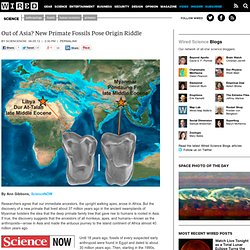

Out of Asia? New Primate Fossils Pose Origin Riddle. By Ann Gibbons, ScienceNOW Researchers agree that our immediate ancestors, the upright walking apes, arose in Africa.

But the discovery of a new primate that lived about 37 million years ago in the ancient swamplands of Myanmar bolsters the idea that the deep primate family tree that gave rise to humans is rooted in Asia. If true, the discovery suggests that the ancestors of all monkeys, apes, and humans—known as the anthropoids—arose in Asia and made the arduous journey to the island continent of Africa almost 40 million years ago. Until 18 years ago, fossils of every suspected early anthropoid were found in Egypt and dated to about 30 million years ago. Then, starting in the 1990s, researchers began discovering the remains of petite primates that lived 37 million to 45 million years ago in China, Myanmar, and other Asian nations. The Out-of-Asia scenario may have been complex. This story provided by ScienceNOW, the daily online news service of the journal Science. Level 3 of Consciousness by Richard Brodie.
Meme Central Books Level 3 Resources Richard Brodie Virus of the Mind What’s New? Site Map Level 3 of Consciousness You are reading about something that most people don’t even know exists. If you told them, they wouldn’t just not believe you—they would have no clue what you were talking about. That’s why I wrote this little essay: so that I could show it to someone when they had no idea what I was talking about and, if they were persistent and open-minded, make some progress in their thinking. 1. Sometimes like attracts like and sometimes opposite attracts opposite. When like attracts like, it can end there, like an oxygen molecule made up of two oxygen atoms, or it can continue to attract like, like a Carbon atom. 2.
Sometimes a self-replicating thing makes a copy of itself with a mistake in it. The only way for new things to get created is by a complex series of mistakes that turn out to be better after all. 3. 4. 5. 6. 7. 8. 9. 10. Masaru Emoto. Un article de Wikipédia, l'encyclopédie libre. Pour les articles homonymes, voir Emoto. Masaru Emoto (江本 勝, Masaru Emoto?) , né le 22 juillet 1943, est un auteur japonais connu pour sa théorie sur les effets de la pensée et des émotions sur l'eau.
Biographie[modifier | modifier le code] Après avoir suivi des études en relations internationales à l'université de Yokohama, il a créé IHM Corporation à Tokyo en 1986. Il a publié plusieurs ouvrages présentant des clichés de cristaux de molécules d'eau. En 2006, Emoto a publié avec Dean Radin une étude randomisée à double insu sur 2000 sujets japonais, qui mettait en évidence une capacité d'influencer l'aspect esthétique des cristaux de molécules d'eau, et ce malgré la distance qui les séparait des spécimens, qui étaient en Californie[1].
Critiques[modifier | modifier le code] Les travaux d'Emoto n'ont jamais été publiés dans une revue scientifique à comité de lecture. Publications[modifier | modifier le code] Notes[modifier | modifier le code] An Essay by Einstein. "How strange is the lot of us mortals!

Each of us is here for a brief sojourn; for what purpose he knows not, though he sometimes thinks he senses it. But without deeper reflection one knows from daily life that one exists for other people -- first of all for those upon whose smiles and well-being our own happiness is wholly dependent, and then for the many, unknown to us, to whose destinies we are bound by the ties of sympathy. A hundred times every day I remind myself that my inner and outer life are based on the labors of other men, living and dead, and that I must exert myself in order to give in the same measure as I have received and am still receiving... "I have never looked upon ease and happiness as ends in themselves -- this critical basis I call the ideal of a pigsty.
The ideals that have lighted my way, and time after time have given me new courage to face life cheerfully, have been Kindness, Beauty, and Truth. "My political ideal is democracy.